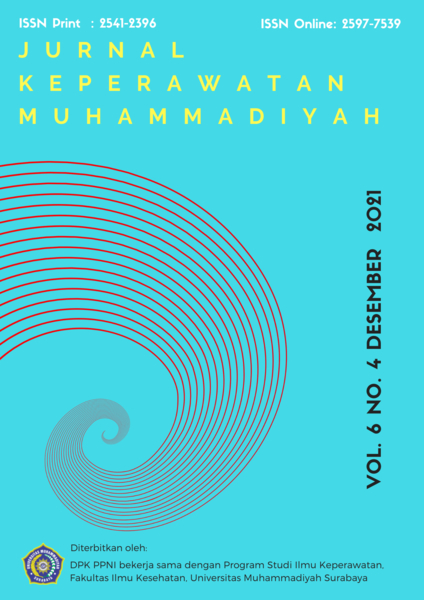Hubungan Indeks Massa Tubuh Dengan Perubahan Sudut Tibiofemoral Pada Lansia di Karang Werdha Dirgantara Malang
DOI:
https://doi.org/10.30651/jkm.v6i4.10519Keywords:
Elderly, body mass index, tibiofemoral angleAbstract
Objective: Elderly is a period of a person in which organ function has shown a decline. In addition, the elderly also experience a decrease in physical activity. An imbalance between physical activity and consumption can cause weight gain in the elderly. As body weight increases in the elderly, the body mass index also increases. High body mass index can cause deformity. The deformity of the knee joint can be a change in the angle of the tibiofemoral joint. The tibiofemoral joint is formed from the articulation between the convex surface of the femoral condyle and the condyle of the tibial plateau. The angle of the tibiofemoral joint in the frontal plane has a normal value of 5 degrees to 10 degrees valgum. Changes in the tibiofemoral angle can be caused by many factors such as a high body mass index which can lead to genu valgum deformity and genu varum deformity.
Methods: This research method is analytical observation design with a cross sectional approach. The number of respondents in this study were 43 respondents consisting of 32 female respondents and 11 male respondents. The sampling technique used is random sampling. The statistical test used in this study is the Sommer's D test.
.Results: The results of statistical tests using the Sommer's D test obtained the value of P value 0.121, which means that the correlation between body mass index and changes in the tibiofemoral angle is very weak and the significant value is 0.391 (sig > 0.05).
Conclusion: There is no correlation between Body Mass Index and Tibiofemoral Angle Changes in the Elderly Karang Werdha Dirgantara Malang
References
Amira, V.,2018. Karya Tulis ilmiah Gambaran Kualitas Hidup Lanjut Usia di UPT Pelayanan Sosial Tresna Werdha Magetan. Universitas Muhammadiyah Ponorogo
Arisman, D.2018. Buku Ajar Ilmu Gizi : Obesitas, Diabetes Melitus dan Dislipidmia. Jakarta : Penerbit Buku Kedokteran
Atikah, A. 2019. Hubungan Indeks Massa Tubuh (IMT) dengan Status Periodontal pada Pemuda – pemudi Dukuh Peneger Kebumen. Politeknik Kesahatan Jojakarta
Baruah, R.K.et al. 2017. Development Pattern of Tibiofemoral Angle in Healthy North – East Indian Children .Diakses tanggal 25 Februari 2021. J Child Orthop 2017;11:339-347. DOI 10.1302/1863-2548.11.170047
Dewi, Sofia Rhosma. 2015. Buku Ajar Keperawatan Gerontik. Yogyakarta : Deepublish
Dutton,.2017. Dutton’s Orthopedic Examination,Evaluation, and Intervention, Fourth Edition, China : Mc.Graw – Hill Education
Kemenkes RI, 2014. Profil Kesehatan Indonesia. Jakarta : Kementrian Kesehatan Republik Indonesia
Khasanah, D.,N.2017. Hubungan Antara Asupan Karbohidrat dan Lemak dengan Kadar Trigliserida pada Pesanam Aerobik Wanita. Jurnal Nutrisia Vol.19 Nomor 2,September 2017
Kotwal, P.2016. Orthopedics and Applied Physiotherapy . Delhi: Elsevier
Mohanty, N.,R., & Koley, S. 2018. A Study Lower Ekstrimity Malaligment and it’s Correlation to Qangle in state lavel athlethes of Odisha. International Jurnal of Health Sciences & Research Vol 8 : Issue : 11 November 2018
Neumann, A., D. 2016. Kinesiology of The Musculoskeletal System Foundation for Rehabilitation Third Edition. London: Mosby Elsevier
Pribadi, Agus. 2015. Pelatihan Aerobik untuk Kebugaran Paru Jantung bagi Lansia. Diakses . Jurnal Olahraga Prestasi, Vol. 11 Nomor 2, Juli 2015.
Rahayu,Tri Novia. 2017. Hubungan Asupan Energi, Karbohidrat ,dan Lemak dengan status Obesitas pada Lansia.Program Studi Ilmu Gizi Fakultas Ilmu Kesehatan. Universitas Muhammadiyah Surakarta
Riskesdas, 2018. Hasil Utama Riskesdas 2018. Jakarta : Kementerian Republik Indonesia
Sembiring, Samuel. 2018. Diagnosis Diferensial Lutut. Medan : Leutikapro
Shultz, S., J., Peggy, A., H., & David, H.,P. 2015. Examination of Musculoskeletal Injuries with Web Resource-4th Edition. United States of America: Human Kinetics
Solikhah,T.A.M. 2019. Hubungan pola Makan dan Satus gizi pada Lansia. Fakultas ilmu Kesehatan.Universitas Muhammadiyah Ponorogo. ISBN 978-602-0791-41-8
Tandirerung,F.J.,2019. Hubungan Indeks Massa Tubuh terhadap Gangguan Muskuloskeletal pada Pra Lansia dan Lansia di Puskesmas Komunji Palu. Jurnal Kesehatan Tadulako Vol.5 No.2 ; Mei 2019 ; 1-71
Umunnah, J. Ogbueche,C.,Ucenwoke, C.,& Okemuo, A., Association of tibiofemoral angle, quadriceps angle and body mass index in a selected adolescent population .DOI: https://doi.org/10.4314/ahs.v20i2.43
Downloads
Published
Issue
Section
License
- Penulis tetap memegang hak atas karyanya dan memberikan hak publikasi pertama kepada jurnal ini yang secara simultan karya tersebut dilisensikan di bawah:Â Creative Commons Attribution-ShareAlike 4.0 International (CC BY-SA 4.0)













